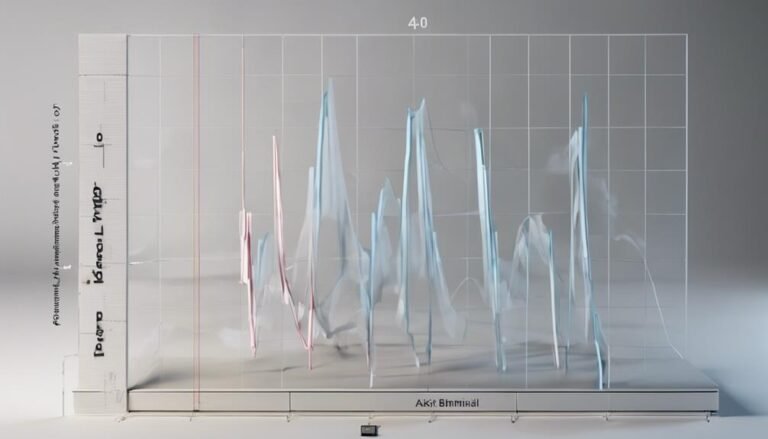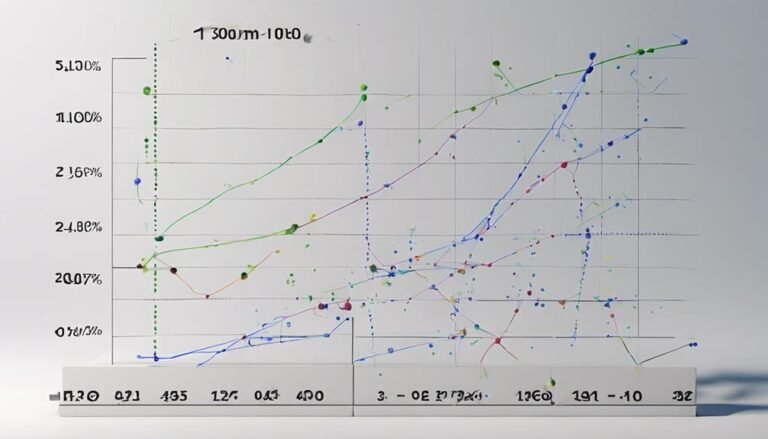Electronic Check (E-Check): Definition and How It Works
E-Checks, or Electronic Checks, reveal traditional paper checks digitally, offering robust security and cost efficiency. They utilize encryption and digital signatures for verification. Transaction fees typically range from $0.30 to $1.50, making them economical for businesses and individuals. E-Checks are set up through banks or payment processors like Square, Stripe, or PayPal, requiring payment details and authorization. These checks are accessible to anyone with a bank account or access to payment processors. Understanding E-Checks' definition and workings exposes the convenience and security they provide in modern payment systems.
Key Takeaways
- E-Check replicates paper checks in digital form for online payments.
- Security features like encryption and digital signatures enhance transaction safety.
- E-Checks offer cost-effective transaction fees, typically ranging from $0.30 to $1.50.
- Users can set up e-checks through banks or payment processors like Square and PayPal.
- Accessibility to anyone with a bank account or access to payment processors for e-check services.
Definition of E-Check
E-Check, also known as an electronic check, is a digital form of payment that replicates the functionality of a traditional paper check through online or network-based transactions.
The E-check authentication process involves multiple security features such as public key cryptography, digital signatures, and encryption to guarantee secure fund routing.
Regarding transaction fees, eChecks offer cost advantages with average fees ranging from $0.30 to $1.50, markedly lower than paper checks. This cost-effectiveness makes eChecks an attractive payment option for businesses and individuals looking to streamline their payment processes.
Key Characteristics of E-Checks
Characterized by advanced security features and streamlined processing, electronic checks (e-checks) offer a modern and efficient payment solution for online transactions. One key advantage of e-checks is their enhanced security, incorporating features like encryption and digital signatures to safeguard transactions.
Additionally, the implementation strategies for e-checks involve setting up e-check services through banks or payment processors like Square, Stripe, or PayPal. Users need to provide payment details and authorize transactions to send e-checks. This approach guarantees that e-check services are accessible to anyone with a bank account or access to payment processors.
Benefits of E-Checks
Given the enhanced security features and streamlined processing of electronic checks, it is imperative to highlight the substantial cost savings and increased efficiency that define the benefits of utilizing e-checks in the domain of online transactions.
E-checks offer significant cost savings compared to traditional paper checks, with average transaction fees ranging from $0.30 to $1.50. The lower costs stem from the elimination of physical check production and postage expenses.
Additionally, e-checks provide enhanced payment security through multiple authentication levels, encryption, and digital signatures, reducing the risk of fund theft. These security features make electronic checks a safer payment method, ensuring secure and efficient fund transfers for businesses and individuals alike.
Direct Deposit System Overview
The Direct Deposit System, a widely adopted electronic payment method, facilitates the direct transfer of funds into individuals' designated bank accounts. This system aligns with current electronic payment trends and showcases payroll automation advancements. Direct deposits by employers and government entities streamline payment processes, reducing the reliance on physical checks. This method offers a secure and efficient way for individuals to receive their wages, benefits, and refunds. The table below highlights key aspects of the Direct Deposit System:
| Aspect | Description | Importance |
|---|---|---|
| Efficiency | Directly transfers funds, eliminating physical check handling | Streamlines payment processes |
| Security | Ensures secure and accurate fund transfers | Protects against fraud |
| Convenience | Convenient way for individuals to receive payments | Enhances user experience |
Sending E-Checks Online
Utilizing electronic check services enables swift and secure online payment transactions for individuals and businesses alike. When sending e-checks online, it is important to take into account e-check fraud prevention measures to safeguard against unauthorized transactions.
E-check payment processors like Square, Stripe, and PayPal facilitate the seamless transfer of funds electronically. These processors employ encryption, digital signatures, and authentication protocols to guarantee the security of e-check transactions. By utilizing reputable e-check payment processors, individuals and businesses can mitigate the risk of fraud and unauthorized access to sensitive financial information.
Choosing trusted platforms with robust security features is essential in maintaining the integrity of e-check transactions and protecting against potential threats.
Processing E-Checks Efficiently
Moving on from the discussion on sending e-checks online, effective processing of e-checks is vital for ensuring timely and secure fund transfers in electronic transactions.
Efficient processing of e-checks involves utilizing digital authentication methods to verify the authenticity of transactions swiftly. Digital authentication plays an essential role in streamlining the verification process, reducing the risk of fraud, and ensuring that funds are transferred accurately.
Security Measures for E-Checks
Effective implementation of robust security measures is essential for safeguarding e-check transactions against potential risks and ensuring secure electronic fund transfers. When considering the security of e-checks, two critical factors come into play:
- Encryption Protocols: Utilizing advanced encryption algorithms to secure e-check data during transmission and storage is vital in preventing unauthorized access and maintaining confidentiality.
- Fraud Prevention Techniques: Implementing sophisticated fraud detection systems and authentication processes can help identify and mitigate fraudulent activities, ensuring the integrity of e-check transactions.
- Secure Payment Processing Protocols: Employing secure protocols and technologies during payment processing stages adds an extra layer of protection against cyber threats, enhancing the overall security of e-check transactions.
Conclusion
To sum up, electronic checks, or e-checks, have revolutionized payment methods by providing a secure and efficient alternative to traditional paper checks. With multiple authentication layers and robust security protocols, e-checks guarantee safe financial transactions in today's digital landscape.
The cost-effectiveness and convenience of e-checks make them a compelling choice for businesses and individuals alike. As technology continues to advance, e-checks stand as a trusted payment option for the future.







